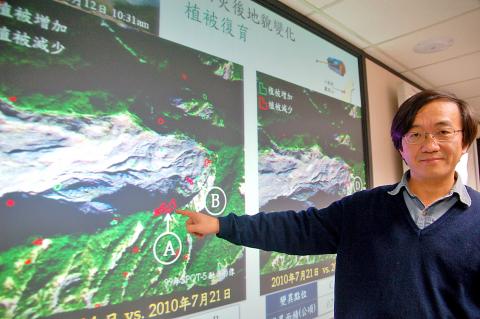Remote sensing scientist Chen Kun-shan (陳錕山) was not involved in any sensitive research projects in Taiwan before he defected to China, the Ministry of National Defense said yesterday.
Chen, head of the Center for Space and Remote Sensing Research at National Central University (NCU) since 2001, disappeared in September last year. He is now working at China’s State Key Laboratory of Remote Sensing Science under Beijing’s high-profile “Thousand Talents Program,” which seeks to attract overseas scientists.
In a front-page story yesterday, the Chinese-language Liberty Times (the Taipei Times’ sister newspaper) cited an intelligence source as saying that Chen’s defection posed a “serious threat” to Taiwan’s national security.

Photo: Hsieh Wen-hua, Taipei Times
As head of the center, Chen had access to satellite images covering Taiwan and China’s military deployments, and was in a category of government employees with access to state secrets and restricted from visiting China, the report said.
However, Ministry of Defense spokesman Major General David Lo (羅紹和) yesterday said that Chen had undertaken research projects commissioned by the Chung-Shan Institute of Science and Technology (CSIST, 中山科學研究院) and the ministry’s Communications Development Office, all of which were academic in nature and unrelated to key military technologies.
Meanwhile, Ministry of Education Secretary-General Wang Tsuo-tai (王作台) said that Chen was suspended by the university in November last year, two months after he went absent without leave.
Wang said the university learned through Chinese media reports in March that Chen had been hired to work at State Key Laboratory of Remote Sensing Science.
The reports were later verified with Beijing through the Mainland Affairs Council, he added.
The university confirmed yesterday that it had decided on April 7 to dismiss Chen and had submitted his case to the Ministry of Education for final approval.
Kainan University vice president David Huang (黃適卓) yesterday lambasted Minister of Education Chiang Wei-ling (蔣偉寧), accusing the education ministry of failing to implement proper preventive mechanisms on cross-strait academic interaction.
Huang said Chiang should take full responsibility for what he described as a “national security fiasco” and step down, as Chuang had been instrumental in promoting the disloyal Chen to his position at the NCU center.
Huang said China has long coveted Taiwanese technology and has been using the guise of academic interaction to implement its “united front” rhetoric.
Huang said that China is still absorbing what it can of Taiwan’s academic research, especially in nanotechnology, agricultural sciences and husbandry, and information technology, in which Taiwan has made significant advances.
Cooperation between academia and the military has a long history, and many military projects have sought the participation of educators, Huang said, adding that these professors have been targeted by Chinese intelligence for contact.
Before both sides of the Taiwan Strait agreed to academic exchanges, contacting Taiwanese academics had been the job of Taiwanese businesspeople in China, Huang said, adding that after academic exchanges were approved, China has used that channel to contact educators directly.

The paramount chief of a volcanic island in Vanuatu yesterday said that he was “very impressed” by a UN court’s declaration that countries must tackle climate change. Vanuatu spearheaded the legal case at the International Court of Justice in The Hague, Netherlands, which on Wednesday ruled that countries have a duty to protect against the threat of a warming planet. “I’m very impressed,” George Bumseng, the top chief of the Pacific archipelago’s island of Ambrym, told reporters in the capital, Port Vila. “We have been waiting for this decision for a long time because we have been victims of this climate change for

MASSIVE LOSS: If the next recall votes also fail, it would signal that the administration of President William Lai would continue to face strong resistance within the legislature The results of recall votes yesterday dealt a blow to the Democratic Progressive Party’s (DPP) efforts to overturn the opposition-controlled legislature, as all 24 Chinese Nationalist Party (KMT) lawmakers survived the recall bids. Backed by President William Lai’s (賴清德) DPP, civic groups led the recall drive, seeking to remove 31 out of 39 KMT lawmakers from the 113-seat legislature, in which the KMT and the Taiwan People’s Party (TPP) together hold a majority with 62 seats, while the DPP holds 51 seats. The scale of the recall elections was unprecedented, with another seven KMT lawmakers facing similar votes on Aug. 23. For a

Taiwan must invest in artificial intelligence (AI) and robotics to keep abreast of the next technological leap toward automation, Vice President Hsiao Bi-khim (蕭美琴) said at the luanch ceremony of Taiwan AI and Robots Alliance yesterday. The world is on the cusp of a new industrial revolution centered on AI and robotics, which would likely lead to a thorough transformation of human society, she told an event marking the establishment of a national AI and robotics alliance in Taipei. The arrival of the next industrial revolution could be a matter of years, she said. The pace of automation in the global economy can

All 24 lawmakers of the main opposition Chinese Nationalists Party (KMT) on Saturday survived historical nationwide recall elections, ensuring that the KMT along with Taiwan People’s Party (TPP) lawmakers will maintain opposition control of the legislature. Recall votes against all 24 KMT lawmakers as well as Hsinchu Mayor Ann Kao (高虹安) and KMT legislative caucus whip Fu Kun-chi (傅崐萁) failed to pass, according to Central Election Commission (CEC) figures. In only six of the 24 recall votes did the ballots cast in favor of the recall even meet the threshold of 25 percent of eligible voters needed for the recall to pass,